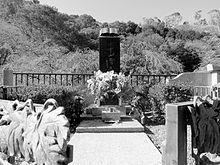Shūji Terayama
Shūji Terayama ( Japanese 寺 山 修 司 , Terayama Shūji ; born December 10, 1935 in Hirosaki , Aomori Prefecture ; † May 4, 1983 in Tokyo ) was a Japanese writer and film director . He repeatedly caused controversy with his avant-garde works.
Life
Originally he wanted to be a photographer. In 1954, Terayama won Tanka Kenkyu magazine's "New Poetry" award for some of his haiku and tanka . In the same year he began his studies at Waseda University , which he had to drop out a short time later because he was diagnosed with nephritis .
From the early 1960s he worked as a filmmaker, mainly in independent and experimental films . For example, he wrote the screenplay for the feature film Das Mädchen Nanami (1968) together with Susumu Hani . In 1964 he received the Prix Italia for the radio drama Yamamba . In 1966 he founded the theater company Tenjo Sajiki with his wife Eiko Kujo . His sexually permissive short film Tomato Kecchappu Kōtei about insurgent children, published in 1971, was highly controversial. This was followed by feature films such as Werft die Bücher und geht auf den Straßen (1971) and the erotic film The Fruits of Passion (1981) with Klaus Kinski in the lead role. He was nominated for the Japanese Academy Award in 1979 for the screenplay for Yōichi Higashi's Sādo . In 1974 his novel Before my eyes, a wilderness (Fischer Verlag) was published in German . In 1976 he received the Will Wehling Memorial Award of the West German Short Film Festival for Tale of Labyrinth .
On May 4, 1983, Terayama died of nephritis at the age of 47. His last film Farewell, Ark was released posthumously in 1984 and screened in competition at the 1985 Cannes Film Festival .
Filmography (selection)
- 1968: The Girl Nanami ( Hatsukoi: Jigoku-hen ) (screenplay)
- 1979: Buraikan (screenplay)
- 1971: Emperor Tomato Ketchup ( Tomato Kecchappu Kōtei )
- 1971: Throw away the books and take to the streets ( Sho o suteyo, machi e deyo )
- 1974: Dying in the Country ( Den'en ni shisu )
- 1977: Boxer ( Bokusā )
- 1979: Third Base ( Sādo ) (screenplay)
- 1980: The Stranger in the Rainforest ( Afurika monogatari ) (screenplay)
- 1981: The fruits of passion ( Les Fruits de la passion )
- 1979: Grass Labyrinth ( Kusa meikyū ) (part of the anthology Collections privées ; single publication in Japan: 1983)
- 1984: Farewell, Arche ( Saraba hakobune )
literature
- Genso Butai Shashincho. Tenjo Sajiki No Hitobito. [A collection of stage fantasy photos. Tenjo-Sajiki people]. Tokyo, Doyobitjutsu-Sha, 1977.
- Carefree, Carol Fisher: Unspeakable Acts: The Avant-garde Theater of Terayama Shuji And Postwar Japan , University of Hawaii Press 2005, ISBN 0824827961 .
Web links
- Shūji Terayama in the Internet Movie Database (English)
Individual evidence
- ↑ Donald Richie: Through the Terayama looking glass . The Japan Times Online, Jan. 7, 2007.
| personal data | |
|---|---|
| SURNAME | Terayama, Shūji |
| ALTERNATIVE NAMES | 寺 山 修 司 (Japanese) |
| BRIEF DESCRIPTION | Japanese writer and film director |
| DATE OF BIRTH | December 10, 1935 |
| PLACE OF BIRTH | Hirosaki , Aomori Prefecture, Japan |
| DATE OF DEATH | May 4th 1983 |
| Place of death | Tokyo |
